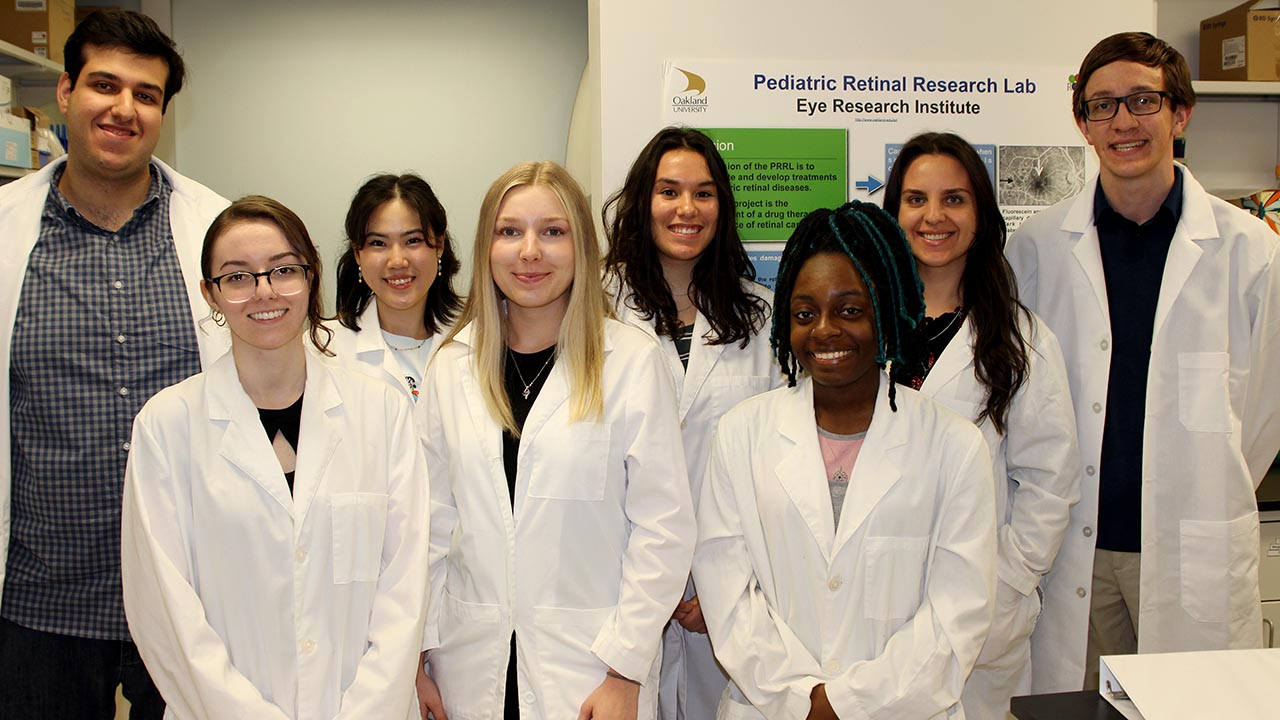OU’s ERI Summer Undergraduate Program in Eye Research welcomes largest class since 2013

Oakland University’s Eye Research Institute (ERI) recently welcomed eight students — the most since 2013 — into its Summer Undergraduate Program in Eye Research.
“For the first time since we got out of the pandemic, it feels like we’re running the program at full speed,” said Dr. Kenneth Mitton, associate professor of biomedical sciences and ERI faculty member. “When we started getting back to normal last summer, we had four students in the program — this summer we have eight. This is reflective of the fact that we have a lot of research going on at OU. We currently have five faculty members actively running labs and doing research, and that expands our capacity to train more people.”
The eight undergraduate students participating in the 2023 summer program include:
• Morgan Carpenter, a junior majoring in biology. Carpenter will be working in the lab of Dr. Mohamed Al-Shabrawey. Carpenter performs ex vivo studies using retinal explant to test the direct effect of bioactive lipids on retinal glial cells and neurons. She analyzes the changes in retinal morphology and assesses neurotoxic pathways in retinal explants.
• Adam Schmitz, a freshman majoring in biomedical sciences. Schmitz will be working in the lab of Dr. Dao-Qi Zhang. Night vision loss is a problem for premature infants, but the cause and mechanisms of the problem are still poorly understood. Schmitz’s project aims to determine how rod-driven neural pathways are altered in a mouse model of oxygen-induced retinopathy. AII amacrine cells are the critical neurons in the pathway. Schmitz will assess the loss of aII amacrine cells in oxygen-induced retinopathy. The results will provide insights into the cellular mechanisms of night vision loss in premature infants.
• Charlene Hsiung, a junior majoring in biochemistry. Hsiung will be working in the lab of Dr. Amany Tawfik. She is learning new techniques related to Dr. Tawfik's research, including PCR, tissue culture, animal genotyping. Her project is Homocysteine’s role in age related macular degeneration.
• Omar Elzyat, a junior majoring in health science and pre-health professional studies. Elzyat will be working in the lab of Dr. Amany Tawfik. Elzyat is also learning new techniques related to Dr. Tawfik's project on Homocysteine.
• Michelle Tcherniak, a junior majoring in biomedical science. Tcherniak will be working in the lab of Dr. Andrew F.X. Goldberg. Tcherniak is helping to study the Impacts of a prph2 Y285x mutation on localization of ABCA4, an essential detoxifying transporter in the human retina. She will spend her summer learning the fundamental scientific process, as prescribed in the five-fold path to enlightenment. She will learn and practice applying this process to designing, implementing, analyzing, and communicating her experiments. In particular, Tcherniak will conduct immunohistochemical analyses on mouse retinas that model human inherited retinal degeneration, to interrogate one potential mechanism of pathophysiology.
• Cecile Pinnock, a senior majoring in bioengineering. Pinnock will be working in the lab of Dr. Kenneth Mitton. Pinnock is testing development of a cell-based assay system to characterize the dose response of an important receptor for growth of the retinal vasculature, called Frizzled-4. She is testing Noregen, a protein therapeutic based on human Norrin, which is the growth factor that activates Frizzled-4. This is part of the pre-clinical research for Noragen, whose production was developed by Dr. Mitton working with Caeregen Therapeutics.
• Victoria Jobczyk, a junior majoring in health science and pre-heath professional studies. Jobczyk will be working in the lab of Dr. Kenneth Mitton. She is assisting with the testing of Noregen and also will be testing the barrier integrity of Primary Human Retinal Endothelial Cells when treated with Norrin (or Noregen).
• Jennifer Jaster, a junior majoring in biochemistry. Jaster will be working in the labs of Dr. Mohamed Al-Shabrawey and Dr. Colin Wu. She will be expressing and purifying the human (and rat) GPR31 and GPR39 proteins that have epitope tags on either end. She will then measure their relative binding specificities towards 12/15-HETE ligands using isothermal titration calorimetry.
“The students will complete research compliance training for their particular lab’s needs and work on research projects underway in ERI labs,” Mitton said.
The students will also attend the “ERI Lunch and Learn Summer Vision Science and Medicine” series. The series takes place once a week and various topics are relating to vision science and research are presented by ERI faculty, as well as faculty from the Ophthalmology Department at Beaumont Hospital in Royal Oak.
For more information about the Eye Research Institute, visit www.oakland.edu/eri.

 June 01, 2023
June 01, 2023







